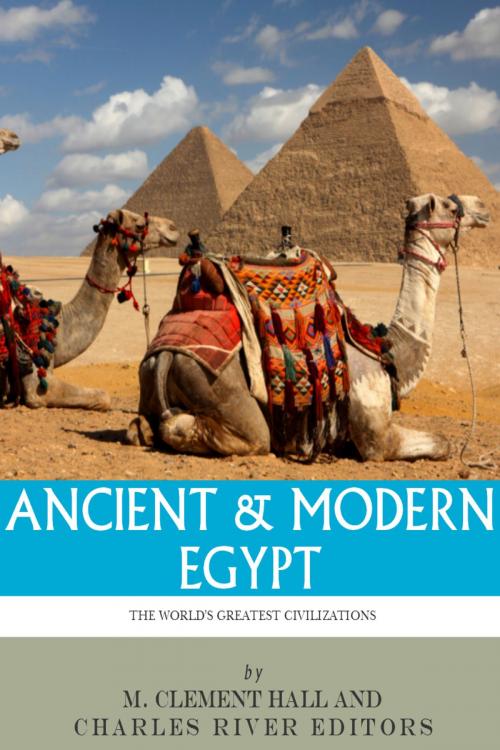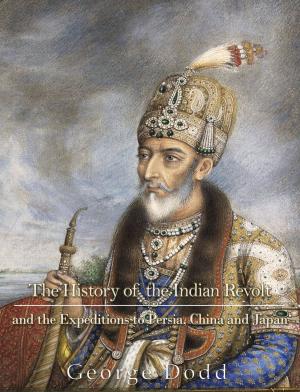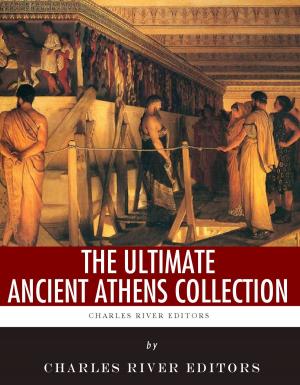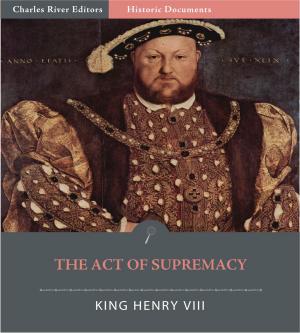The History and Culture of Ancient and Modern Egypt
Nonfiction, History, Africa, Egypt, Ancient History| Author: | Charles River Editors | ISBN: | 9781475319637 |
| Publisher: | Charles River Editors | Publication: | November 20, 2012 |
| Imprint: | Language: | English |
| Author: | Charles River Editors |
| ISBN: | 9781475319637 |
| Publisher: | Charles River Editors |
| Publication: | November 20, 2012 |
| Imprint: | |
| Language: | English |
*Covers the history and culture of Ancient Egypt from 3,000-30 B.C.*Covers the history and culture of Modern Egypt from 1800-2012*Includes pictures of famous people, places, art, and events in Egypt*Includes a Table of Contents. Africa may have given rise to the first human beings, and Egypt probably gave rise to the first great civilizations, which continue to fascinate modern societies across the globe nearly 5,000 years later. From the Library and Lighthouse of Alexandria to the Great Pyramid at Giza, the Ancient Egyptians produced several wonders of the world, revolutionized architecture and construction, created some of the worlds first systems of mathematics and medicine, and established language and art that spread across the known world. With world-famous leaders like King Tut and Cleopatra, its no wonder that todays world has so many Egyptologists.What makes the accomplishments of the Ancient Egyptians all the more remarkable is that Egypt was historically a place of great political turbulence. Its position made it both valuable and vulnerable to tribes across the Mediterranean and the Middle East, and Ancient Egypt had no shortage of its own internecine warfare. Its most famous conquerors would come from Europe, with Alexander the Great laying the groundwork for the Hellenic Ptolemy line and the Romans extinguishing that line after defeating Cleopatra and driving her to suicide. About 2,050 years after Cleopatra's death, Egypt still remains a volatile hotspot. In the last year, Egypt has undergone a revolution that expelled its authoritarian leader of nearly 30 years and implemented elections that have pitted the Egyptian military in a power struggle with the Muslim Brotherhood, the long-time Islamic opposition group with ties to Hamas and elements of al-Qaeda. Making everything that much more surreal, the events have played out before well placed television cameras with continuous real time coverage of the revolution and ongoing turmoil, and foreign nations around the world eagerly await or dread the end result. The situation in Egypt sounds messy today, but strife in Egypt is hardly a new occurrence. In fact, conflict has been more of a rule than exception since the end of the 18th century, when Western powers, beginning with Napoleon and the French, got involved in the territory that was at that point a part of the Ottoman Turkish Empire. Since then, European powers came into conflict with each other and local Egyptian officials in their imperialistic efforts, Egyptian nationalists tried to do away with foreign interference, and the critically important Suez Canal became a geopolitical hotspot. And when Egypt finally did receive full independence and sovereignty from the British, it was subjected to conflict between religious extremists, secular forces, pan-Arab nationalists, and oppressive strongmen. The History and Culture of Ancient and Modern Egypt comprehensively covers the history and culture of Ancient Egypt, looking at its religious, political, foreign and military past, and examining all the architectural and artistic achievements from 3,000-30 B.C. It also comprehensively covers this turbulent history, helping to explain and sort through all the different forces at play in Egypt over the last 215 years. Along with maps and pictures of important people, places, and events, you will learn about Ancient and Modern Egypt like you never have before.
*Covers the history and culture of Ancient Egypt from 3,000-30 B.C.*Covers the history and culture of Modern Egypt from 1800-2012*Includes pictures of famous people, places, art, and events in Egypt*Includes a Table of Contents. Africa may have given rise to the first human beings, and Egypt probably gave rise to the first great civilizations, which continue to fascinate modern societies across the globe nearly 5,000 years later. From the Library and Lighthouse of Alexandria to the Great Pyramid at Giza, the Ancient Egyptians produced several wonders of the world, revolutionized architecture and construction, created some of the worlds first systems of mathematics and medicine, and established language and art that spread across the known world. With world-famous leaders like King Tut and Cleopatra, its no wonder that todays world has so many Egyptologists.What makes the accomplishments of the Ancient Egyptians all the more remarkable is that Egypt was historically a place of great political turbulence. Its position made it both valuable and vulnerable to tribes across the Mediterranean and the Middle East, and Ancient Egypt had no shortage of its own internecine warfare. Its most famous conquerors would come from Europe, with Alexander the Great laying the groundwork for the Hellenic Ptolemy line and the Romans extinguishing that line after defeating Cleopatra and driving her to suicide. About 2,050 years after Cleopatra's death, Egypt still remains a volatile hotspot. In the last year, Egypt has undergone a revolution that expelled its authoritarian leader of nearly 30 years and implemented elections that have pitted the Egyptian military in a power struggle with the Muslim Brotherhood, the long-time Islamic opposition group with ties to Hamas and elements of al-Qaeda. Making everything that much more surreal, the events have played out before well placed television cameras with continuous real time coverage of the revolution and ongoing turmoil, and foreign nations around the world eagerly await or dread the end result. The situation in Egypt sounds messy today, but strife in Egypt is hardly a new occurrence. In fact, conflict has been more of a rule than exception since the end of the 18th century, when Western powers, beginning with Napoleon and the French, got involved in the territory that was at that point a part of the Ottoman Turkish Empire. Since then, European powers came into conflict with each other and local Egyptian officials in their imperialistic efforts, Egyptian nationalists tried to do away with foreign interference, and the critically important Suez Canal became a geopolitical hotspot. And when Egypt finally did receive full independence and sovereignty from the British, it was subjected to conflict between religious extremists, secular forces, pan-Arab nationalists, and oppressive strongmen. The History and Culture of Ancient and Modern Egypt comprehensively covers the history and culture of Ancient Egypt, looking at its religious, political, foreign and military past, and examining all the architectural and artistic achievements from 3,000-30 B.C. It also comprehensively covers this turbulent history, helping to explain and sort through all the different forces at play in Egypt over the last 215 years. Along with maps and pictures of important people, places, and events, you will learn about Ancient and Modern Egypt like you never have before.















